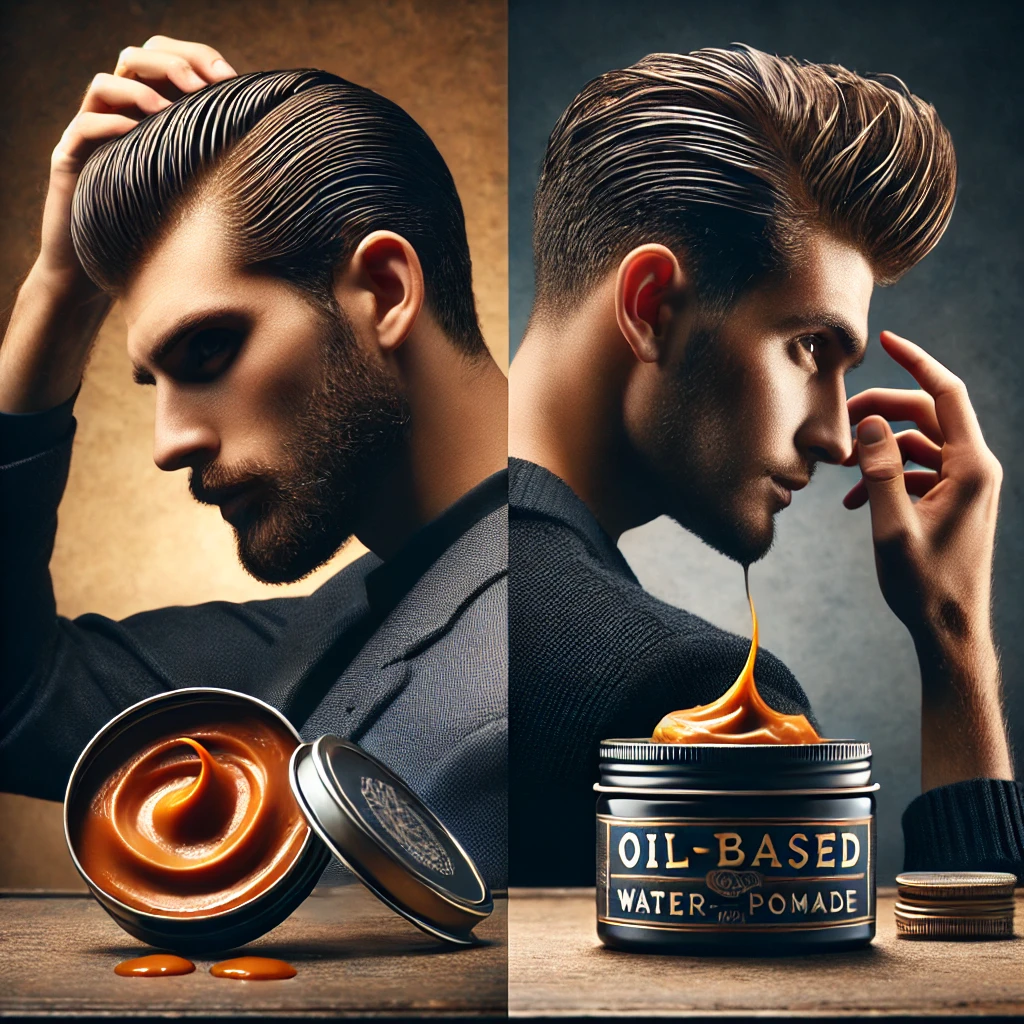Pomades and Their Importance in Grooming
Understanding the Basics of Pomade
Pomade has been a staple in men’s grooming for centuries, offering a way to style hair with precision and hold. Unlike other hair products such as gels or waxes, pomades provide a unique combination of shine and flexibility, making them a favorite among those who want a polished yet natural look. The primary function of pomade is to keep hair in place while maintaining a healthy appearance. However, not all pomades are created equal. The two main types—oil-based and water-based—offer different benefits and drawbacks, which can significantly impact the user’s experience.
The Evolution of Pomade in Grooming History
The history of pomade dates back to ancient civilizations, where natural oils and fats were used to style hair. Over time, the formulation of pomade has evolved, incorporating various ingredients to enhance its performance. In the early 20th century, oil-based pomades became popular due to their long-lasting hold and high shine. However, as grooming habits changed and the demand for easier-to-wash products increased, water-based pomades emerged as a modern alternative. Today, both types of pomade are widely available, each catering to different styling needs and preferences.
The Role of Pomade in Modern Grooming Routines
In contemporary grooming routines, pomade plays a crucial role in achieving a variety of hairstyles, from classic slick-backs to textured looks. The choice between oil-based and water-based pomade can influence not only the final appearance but also the health of the hair and scalp. Understanding the differences between these two types of pomade is essential for anyone looking to make an informed decision about their grooming products. This article will delve into the specifics of oil-based and water-based pomades, comparing their properties, benefits, and potential drawbacks.
Setting the Stage for the Ultimate Showdown
As we embark on this exploration of oil-based vs. water-based pomade, it’s important to recognize that each type has its own set of advantages and disadvantages. The ultimate showdown between these two grooming giants will be determined by factors such as hold, shine, washability, and hair health. By examining these aspects in detail, we aim to provide a comprehensive guide that will help readers choose the right pomade for their individual needs. Whether you’re a seasoned pomade user or new to the world of hair styling, this article will equip you with the knowledge to make an informed decision.
Oil-Based Pomade – The Classic Choice
The Composition of Oil-Based Pomade
Oil-based pomades are traditionally made from a blend of oils, waxes, and sometimes petroleum. These ingredients work together to create a product that offers a strong hold and a high-gloss finish. The oils used in these pomades can vary, with common choices including mineral oil, coconut oil, and lanolin. The waxes, such as beeswax or petroleum jelly, provide the structure needed to keep hair in place throughout the day. This combination of ingredients gives oil-based pomades their signature texture and performance.
The Benefits of Using Oil-Based Pomade
One of the most significant advantages of oil-based pomade is its long-lasting hold. Unlike water-based products, which can dry out and lose their effectiveness over time, oil-based pomades remain pliable, allowing for restyling throughout the day. This makes them an excellent choice for individuals who need a reliable product that can withstand various conditions, from humid weather to physical activity. Additionally, the high shine offered by oil-based pomades is unmatched, making them ideal for achieving a classic, polished look.
Another benefit of oil-based pomade is its ability to nourish the hair and scalp. The oils used in these products can help to moisturize and condition the hair, reducing the risk of dryness and breakage. For individuals with naturally dry or coarse hair, oil-based pomades can provide much-needed hydration, leaving the hair looking healthy and vibrant. Furthermore, the emollient properties of these pomades can help to soothe the scalp, reducing irritation and promoting overall hair health.
The Drawbacks of Oil-Based Pomade
Despite their many benefits, oil-based pomades are not without their drawbacks. One of the most commonly cited issues is their difficulty to wash out. Because oil-based pomades are not water-soluble, they can build up on the hair and scalp, requiring multiple washes or the use of specialized shampoos to remove completely. This can be a significant inconvenience for individuals who prefer a low-maintenance grooming routine.
Another potential downside of oil-based pomade is its heaviness. The thick, greasy texture of these products can weigh down the hair, making it feel less voluminous and more difficult to style. For individuals with fine or thin hair, this can be particularly problematic, as it may result in a flat, lifeless appearance. Additionally, the greasy residue left by oil-based pomades can transfer onto clothing, pillows, and other surfaces, which can be both annoying and difficult to clean.
Who Should Use Oil-Based Pomade?
Oil-based pomades are best suited for individuals who prioritize hold and shine over ease of use. They are particularly well-suited for those with thick, coarse, or dry hair, as the nourishing properties of the oils can help to tame and condition unruly locks. Additionally, individuals who prefer a classic, vintage look may find that oil-based pomades offer the perfect combination of style and substance. However, for those with fine or thin hair, or for individuals who prefer a more modern, low-maintenance grooming routine, oil-based pomades may not be the best choice.
Water-Based Pomade – The Modern Alternative
The Composition of Water-Based Pomade
Water-based pomades are a more recent innovation in the world of hair styling, designed to address some of the shortcomings of their oil-based counterparts. As the name suggests, these pomades are primarily composed of water, along with a variety of synthetic polymers, emulsifiers, and conditioning agents. The water content allows these pomades to be easily washed out with regular shampoo, making them a more convenient option for daily use. The synthetic polymers provide the hold and structure needed to keep hair in place, while the conditioning agents help to keep the hair soft and manageable.
The Benefits of Using Water-Based Pomade
One of the most significant advantages of water-based pomade is its ease of use. Unlike oil-based pomades, which can be difficult to wash out, water-based pomades are water-soluble, meaning they can be easily removed with a single shampoo. This makes them an excellent choice for individuals who prefer a low-maintenance grooming routine or who wash their hair frequently. Additionally, the lightweight texture of water-based pomades makes them ideal for individuals with fine or thin hair, as they provide hold without weighing the hair down.
Another benefit of water-based pomade is its versatility. These products can be used to achieve a wide range of styles, from sleek and polished to textured and tousled. The pliable nature of water-based pomades allows for restyling throughout the day, making them a flexible option for individuals who like to change up their look. Furthermore, the conditioning agents in water-based pomades can help to keep the hair soft and healthy, reducing the risk of dryness and breakage.
The Drawbacks of Water-Based Pomade
Despite their many advantages, water-based pomades are not without their drawbacks. One of the most commonly cited issues is their lack of long-lasting hold. Because water-based pomades are water-soluble, they can lose their effectiveness over time, particularly in humid or wet conditions. This can be a significant disadvantage for individuals who need a product that can withstand various environmental factors. Additionally, the hold provided by water-based pomades may not be as strong as that of oil-based pomades, making them less suitable for individuals with particularly unruly or thick hair.
Another potential downside of water-based pomade is its lower shine compared to oil-based products. While some water-based pomades do offer a glossy finish, it is generally not as high as that provided by oil-based pomades. For individuals who prioritize shine in their hairstyle, this can be a significant drawback. Additionally, some water-based pomades may contain synthetic ingredients that can cause irritation or allergic reactions in sensitive individuals, so it’s important to read the label carefully before use.
Who Should Use Water-Based Pomade?
Water-based pomades are best suited for individuals who prioritize convenience and versatility over long-lasting hold and high shine. They are particularly well-suited for those with fine or thin hair, as the lightweight texture of these products can provide hold without weighing the hair down. Additionally, individuals who prefer a modern, low-maintenance grooming routine may find that water-based pomades offer the perfect combination of style and ease of use. However, for those with thick, coarse, or unruly hair, or for individuals who prioritize a high-shine, classic look, water-based pomades may not be the best choice.
Conclusion – Choosing the Right Pomade for You
Summarizing the Key Differences
After exploring the properties, benefits, and drawbacks of both oil-based and water-based pomades, it’s clear that each type has its own unique advantages. Oil-based pomades offer a long-lasting hold and high shine, making them ideal for individuals who prioritize these qualities. However, they can be difficult to wash out and may weigh down fine or thin hair. On the other hand, water-based pomades are easy to use and versatile, making them a great choice for those who prefer a low-maintenance grooming routine. However, they may not provide the same level of hold or shine as oil-based pomades.
Factors to Consider When Choosing a Pomade
When deciding between oil-based and water-based pomade, there are several factors to consider. First and foremost, it’s important to think about your hair type and the specific needs of your hair. Individuals with thick, coarse, or dry hair may benefit from the nourishing properties of oil-based pomades, while those with fine or thin hair may prefer the lightweight texture of water-based pomades. Additionally, consider your styling preferences and the level of hold and shine you desire. If you prioritize a classic, polished look, oil-based pomades may be the better choice. However, if you prefer a more modern, versatile style, water-based pomades may be more suitable.
Another important factor to consider is your grooming routine and how much time and effort you’re willing to invest in washing and styling your hair. If you prefer a low-maintenance routine and frequently wash your hair, water-based pomades may be the more convenient option. However, if you don’t mind a more involved washing process and prioritize long-lasting hold, oil-based pomades may be worth the extra effort.
The Importance of Experimentation
Ultimately, the best way to determine which type of pomade is right for you is through experimentation. Everyone’s hair is different, and what works for one person may not work for another. Don’t be afraid to try out different products and see how they perform on your hair. Pay attention to how each pomade feels, how it styles your hair, and how it holds up throughout the day. Over time, you’ll develop a better understanding of your hair’s needs and preferences, allowing you to make more informed decisions about your grooming products.
Final Thoughts on the Ultimate Showdown
In the ultimate showdown between oil-based and water-based pomades, there is no clear winner. Both types of pomade have their own unique advantages and disadvantages, and the best choice depends on your individual needs and preferences. By understanding the key differences between these two types of pomade and considering factors such as hair type, styling preferences, and grooming routine, you can make an informed decision that will help you achieve the perfect hairstyle. Whether you choose the classic hold and shine of oil-based pomades or the modern convenience of water-based pomades, the most important thing is to find a product that works for you and helps you feel confident in your appearance.










